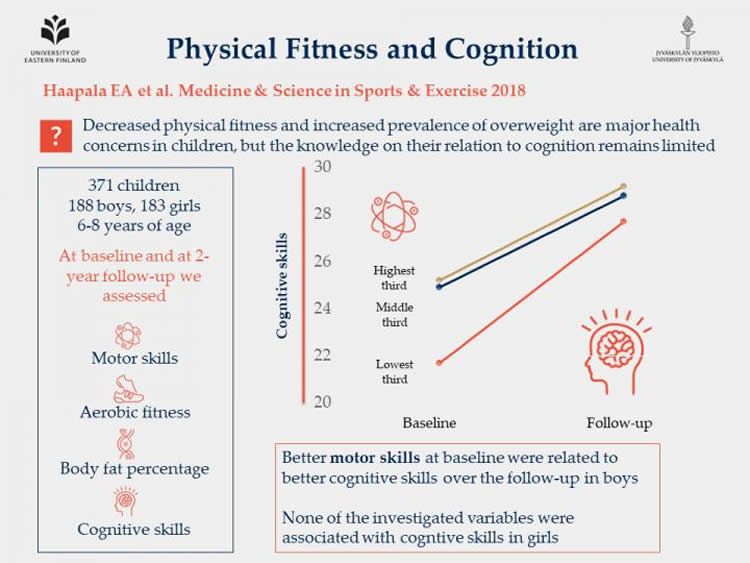Summary: Researchers report boys with better motor skills tend to have higher cognitive scores over a two year follow up period than those with poorer motor skills. Additionally, boys with higher aerobic fitness had poorer cognition during the two year follow up than those with lower fitness levels.
Source: University of Eastern Finland.
Boys with good motor skills are better problem-solvers than their less skilful peers, a new study from Finland shows. In contrast to previous studies, the researchers found no association between aerobic fitness or overweight and obesity with cognitive function in boys. The results are based on the Physical Activity and Nutrition in Children (PANIC) Study conducted at the University of Eastern Finland, and they were published in Medicine & Science in Sports & Exercise.
The study found that boys with better motor skills at baseline had higher cognitive scores over a two-year follow-up period than boys who had poorer motor skills. In contrast to previous cross-sectional studies, the present study shows that children with different levels of aerobic fitness or body fat percentage did not differ in cognition. In fact, boys with higher aerobic fitness at the baseline of the study had poorer cognition during the two-year follow-up than those with lower fitness.
In girls, none of the above-mentioned factors was associated with cognitive skills. This may be due to biological or sociocultural differences between boys and girls.
The results also show that boys with better motor skills at baseline had a smaller increase in their cognitive skills than those with poorer motor skills.

“It is important to remember that these results do not necessarily reflect a causal relation between motor skills and cognition. Boys with poorer motor and cognitive skills at baseline caught up with their more skilful peers during the two-year follow-up,” says Postdoctoral Researcher Eero Haapala from the University of Jyväskylä. Dr Haapala is also Adjunct Professor of Paediatric Exercise Physiology at the University of Eastern Finland.
The results suggest that motor skills and cognition are associated with one another in boys; however, it would be premature to claim that motor skills boost cognition. Furthermore, the study found no association between aerobic fitness or overweight and obesity with cognition.
The study investigated the longitudinal associations of motor skills, aerobic fitness, and body fat percentage with cognition in 371 children who were 6-8-years old at baseline. Motor skills were evaluated by agility, balance and manual dexterity tests, aerobic fitness by a maximal cycle ergometer test, and body fat percentage by a DXA-device. Cognition was assessed by the Raven’s Matrices Test. Several confounding factors such as parental education and annual household income were controlled for in the analyses.
Source: Eero Haapala – University of Eastern Finland
Publisher: Organized by NeuroscienceNews.com.
Image Source: NeuroscienceNews.com image is credited to Eero Haapala.
Original Research: Abstract for “Longitudinal Associations of Fitness, Motor Competence, and Adiposity with Cognition” by Haapala EA, Lintu N, Väistö J, Tompuri T, Soininen S, Viitasalo A, Eloranta AM, Venäläinen T, Sääkslahti A, Laitinen T, and Lakka TA in Medicine & Science in Sports & Exercise. Published December 4 2018.
doi:10.1249/MSS.0000000000001826
[cbtabs][cbtab title=”MLA”]University of Eastern Finland”Boys with Good Motor Skills Excel at Problem Solving Too.” NeuroscienceNews. NeuroscienceNews, 17 December 2018.
<https://neurosciencenews.com/boy-motor-skills-problem-solving-10358/>.[/cbtab][cbtab title=”APA”]University of Eastern Finland(2018, December 17). Boys with Good Motor Skills Excel at Problem Solving Too. NeuroscienceNews. Retrieved December 17, 2018 from https://neurosciencenews.com/boy-motor-skills-problem-solving-10358/[/cbtab][cbtab title=”Chicago”]University of Eastern Finland”Boys with Good Motor Skills Excel at Problem Solving Too.” https://neurosciencenews.com/boy-motor-skills-problem-solving-10358/ (accessed December 17, 2018).[/cbtab][/cbtabs]
Abstract
Longitudinal Associations of Fitness, Motor Competence, and Adiposity with Cognition
Purpose
To investigate the longitudinal associations of cardiorespiratory fitness (CRF), motor competence (MC), and body fat percentage (BF%) with cognition in children.
Methods
Altogether 371 children (188 boys, 183 girls) aged 6–9 years at baseline participated in this 2-year follow-up study. We assessed CRF by maximal cycle ergometer test, computed the MC score from the z-scores of 50-metre shuttle run, static balance, and box and block test results, measured BF% by dual-energy X-ray absorptiometry, and assessed cognition using the Raven’s Coloured Progressive Matrices (RCPM) score. The associations were studied by linear regression analysis and analysis of covariance with repeated measures.
Results
In boys, a higher MC score (β=-0.161, 95% CI=-0.314 to -0.009), a shorter 50-metre shuttle run test duration (β=0.152, 95% CI=0.007 to 0.296), and a higher number of cubes moved in the BBT (β=-0.161, 95% CI=-0.309 to -0.013) at baseline were associated with a smaller increase in the RCPM score during follow-up. These associations were largely explained by the RCPM score at baseline. However, boys in the highest third (mean difference=2.5, 95% CI for difference=0.66 to 4.33) and the middle third (mean difference=2.1, 95% CI for difference=0.39 to 3.82) of the MC score at baseline had a higher RCPM score over the 2-year follow-up than boys in the lowest third. CRF, MC, or adiposity were not associated with the RCPM score in girls. Changes in CRF, MC, or BF% were not associated with changes in cognition.
Conclusions
Higher MC at baseline predicted better cognition during the first two school years in boys but not in girls. CRF or adiposity was not associated with cognition in boys or girls.






